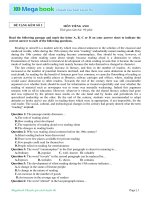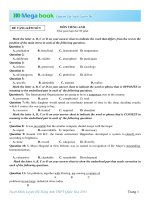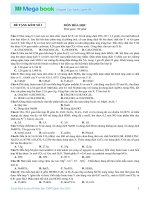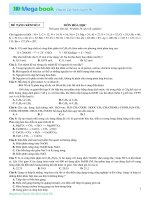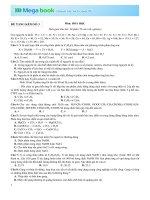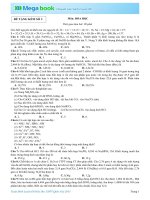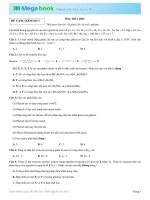Luyện Đề Anh Văn THPT Quốc Gia 2015 Có đáp án Đề Số 6
Bạn đang xem bản rút gọn của tài liệu. Xem và tải ngay bản đầy đủ của tài liệu tại đây (519.08 KB, 14 trang )
Tuyệt Đỉnh Luyện Đề Tiếng Anh THPT Quốc Gia 2015 Trang 1/14 - Mã đề thi 135
MÔN TIẾNG ANH
Thời gian làm bài 90 phút
Mark the letter A, B, C, or D on your answer sheet to indicate the correct answer to each of the following questions.
Question 1: _________every major judo title, Mark retired from international competition.
A. When he won B. Having won C. Winning D. On winning
Question 2: I assure you that I _________ no hostile feeling toward you.
A. shelter B. harbour C. embrace D. cover
Question 3: The opposition will be elected into government at the next election, without a _________ of a doubt.
A. shade B. shadow C. benefit D. hue
Question 4: _________ her fiction describes women in unhappy marriages.
A. Many of B. A large number of C. A great volume of D. Much of
Question 5: It seems that the world record for this event is almost impossible to _________
A. get B. beat C. take D. achieve
Question 6: Tom : “I read somewhere recently that about 137 species of animals and plants become extinct
everyday.” Mary : “__________”.
A. Well, maybe all is not lost yet. B. What’s point?
C. What a pity D. It can’t have happened like that
Question 7: John first dabbled_________ buying old maps for his collection.
A. on B. in C. at D. for
Question 8: I am not sure how old he is but he must be _________ for 70.
A. going by B. getting up C. getting on D. going off
Question 9: The smell was so bad that it completely _________ us off our food.
A. set B. took C. got D. put
Question 10: Some drivers seem to expect everyone else to get _________ their way.
A. away from B. out of C. off D. after
Question 11: He has been waiting for this letter for days, and at _________ it has come.
A. last B. the end C. present D. the moment
Question 12: It is _________ opportunity to see African wildlife in its natural environment.
A. an unique B. a unique C. the unique D. unique
Question 13: The issue _________ question is more complex than you think.
A. from B. at C. on D. in
Question 14: For the first time _________, large portions of the universe can be observed simultaneously.
A. since history B. in history
C. history began D. of the beginning of history
Question 15: Determining the mineral content of soil samples is an exacting process; _________ experts must
perform detail tests to analyze soil specimens.
A. so that B. however C. afterwards D. therefore
Question 16: Peter: “Is it important?”. Thomas: “_________________”.
A. Not on your life ! B. It’s a matter of life and death!
C. No worry, that’s nothing . D. It’s ridiculous.
Question 17: Ann: “Does the global warming worry you?” Mathew: “ __________”.
A. What a shame! B. Oh, it’s hotter and hotter
C. I can’t bear to think about it. D. I don’t like hot weather.
Question 18: You look exhausted. You __________ in the garden all day.
A. must have been working B. must have worked
C. must be working D. can’t have worked
Question 19: I’ve never really enjoyed going to the ballet or the opera; they’re not really my_________.
A. piece of cake B. sweets and candy C. biscuit D. cup of tea
Question 20: The__________ cheered when the final goal was scored in the match today.
A. spectators B. onlookers C. viewers D. audience
Question 21: Only when humans employ non-chemical approaches to pest control _________.
A. will creatures such as roaches and rodents be sucessfully eliminated.
ĐỀ TẶNG KÈM SỐ 6
Tuyệt Đỉnh Luyện Đề Tiếng Anh THPT Quốc Gia 2015 Trang 2/14 - Mã đề thi 135
B. creatures such as roaches and rodents will be successfully eliminated.
C. will creatures such as roaches and rodents be successful elimination.
D. that creatures such as roaches and rodents will be successfully eliminated.
Question 22: Their discussion quickly developed into a _________ argument over who should receive the money.
A. hot B. burning C. heated D. scorching
Question 23: At first there was silence. Then _________ that I knew.
A. came a voice B. a voice came C. a voice is coming D. a voice comes
Question 24: “Have I done something wrong?” “ I wish you_______ more tactful; you’re always offending people”.
A. had been being B. have been C. were being D. were
Question 25: “ Why don’t we ask Martin to chair the meeting?”
“Well, suppose _________ to ask him,do you think he would accept?”
A. were we B. we have C. we try D. we were
Question 26: She is always diplomatic when she deals with angry students.
A. strict B. outspoken C. tactful D. firm
Question 27: Her style of dress accentuated her extreme slenderness.
A. revealed B. betrayed C. disfigured D. emphasized
Question 28: Nobel’s original legacy of nine million dollars was invested, and the interest on this sum is used for the
awards which vary from $30,000 to $125,000.
A. fortune B. prize C. heritage D. bequest
Question 29: A. be B. have C. take D. do
Question 30: A. kept in mind B. clever C. intelligent D. aware
Question 31: A. mind B. thought C. decision D. idea
Question 32: A. purpose B. objectives C. target D. destination
Question 33: A. affect B. effect C. result D. change
Question 34: A. lacking B. short C. incapable D. interested
Question 35: A. cautious B. consider C. reckon D. remember
Question 36: A. career B. business C. job D. work
Question 37: A. mess B. success C. effort D. money
Question 38: A. get out B. carry out C. turn out D. bring out
Question 39: Our civilization is so commonplace to us that rarely we stop to think about its complexity.
A B C D
Question 40: The composer Verdi has written the opera Aida to celebrate the opening of the Suez
A B C
Canal, but the opera was not performed until 1871.
D
Question 41: Wealthy people have always desired and wear precious stones because their beauty
A B C
is lasting.
D
Question 42: Every city in the United States has traffic problems because the amount of cars
A B C
on American streets and highways is increasing every year.
D
Question 43: From archeological evidences, we know that Egyptians were highly organized and civilized.
A B
Moreover, they were skillful in using crafts.
C D
Question 44: The word "standard" is closest in meaning to _________.
A. practical B. customary C. possible D. unusual
Question 45: "The King’s 24 Violins" is mentioned to illustrate _________.
A. the competition in the 1600's between French and Italian orchestras
B. how the violin became a renowned instrument
Tuyệt Đỉnh Luyện Đề Tiếng Anh THPT Quốc Gia 2015 Trang 3/14 - Mã đề thi 135
C. the superiority of French violins
D. why the violin was considered the only instrument suitable to be played by royalty
Question 46: What is the main idea presented in paragraph 3?
A. The violin is probably the best known and most widely distributed musical instrument in the world.
B. The violin has been modified to fit its evolving musical functions.
C. The violin had reached the height of its popularity by the middle of the eighteenth century.
D. The technique of playing the violin has remained essentially the same since the 1600's.
Question 47: The author mentions Vivaldi and Tartini in paragraph 3 as examples of composers whose music ___.
A. inspired more people to play the violin B. had to be adapted to the violin
C. demanded more sophisticated violins D. could be played only by their students
Question 48: The word "they" in paragraph 3 refers to_________.
A. Civaldi and Tartini B. internal structure and fingerboard
C. thinner strings and a higher string tension D. small change
Question 49: The word "strain" is closest in meaning to_________.
A. struggle B. strength C. stress D. strategy
Question 50: The word "Accordingly" is closest in meaning to_________
A. However B. Nevertheless C. Consequently D. Ultimately
Question 51: According to the passage, early violins were different from modern violins in that early violins_____
A. were heavier B. broke down more easily
C. produced softer tones D. were easier to play
Question 52: According to the passage, which of the following contributes to a dull sound being produced by a violin?
A. A long fingerboard B. A small body C. High string tension D. Thick strings
Question 53: All of the following are mentioned in the passage as contributing to the ability to play modern violin
music EXCEPT_________.
A. use of rare wood for the fingerboard and neck
B. more complicated techniques for the left hand
C. different ways to use the fingers to play very high notes
D. minor alterations to the structure of the instrument
Question 54: What does the passage mainly discuss?
A. The development of trade routes through United States cities
B. The importance of geographical situation in the growth of United States cities
C. Contrasts in settlement patterns in United States
D. Historical differences among three large United States cities
Question 55: The word “ingenuity” is closest in meaning to _________.
A. wealth B. traditions C. resourcefulness D. organization
Question 56: The passage suggests that a geographer would consider a city’s soil type part of its _____
A. hinterland B. situation C. site D. function
Question 57: According to the passage, a city’s situation is more important than its site in regard to the city’s_____
A. long-term growth and prosperity B. ability to protect its citizenry
C. possession of favorable weather conditions D. need to import food supplies
Question 58: The author mentions each of the following as an advantage of Chicago’s location EXCEPT its _____.
A. hinterland B. nearness to a large lake
C. position in regard to transport routes D. flat terrain
Question 59: The word “characteristics” is closest in meaning to _________.
A. choices B. attitudes C. qualities D. inhabitants
Question 60: The primary purpose of paragraph 1 is to _________.
A. summarize past research and introduce a new study
B. describe a historical period
C. define a term and illustrate it with an example
D. emphasize the advantages of one theory over another
Question 61: According to the passage, Philadelphia and Boston are similar to New York City in _________.
A. size of population B. availability of rail transportation
C. site D. age
Question 62: The word “functional” is closest in meaning to _________.
Tuyệt Đỉnh Luyện Đề Tiếng Anh THPT Quốc Gia 2015 Trang 4/14 - Mã đề thi 135
A. alternate B. useful C. original D. usable
Question 63: The word “it” refers to _________.
A. hinterland B. account C. connection D. primacy
Question 64: A. mutually B. apologize C. permission D. reaction
Question 65: A. footsteps B. superstitious C. melancholy D. forceful
Question 66: A. survival B. industry C. endangered D. commercial
Question 67: A. geographical B. Aborigine C. expedition D. Australian
Question 68: A. officialdom B. millennium C. westernize D. division
Question 69: It was an interesting novel. I stayed up all night to finish it.
A. I stayed up all night to finish the novel so it was interesting.
B. Unless it were an interesting novel, I would not stay up all night to finish it.
C. Though it was an interesting novel, I stayed up all night to finish it.
D. So interesting was the novel that I stayed up all night to finish it.
Question 70: I did not read his book. I did not understand what the lecturer was saying .
A. What the lecturer wrote and said was too difficult for me to understand.
B. I found it very difficult to understand what the lecturer said in his book.
C. I would have understood what the lecturer was saying if I had read his book.
D. The lecturer's book which I had not read was difficult to understand.
Question 71: We arrived at the airport. We realized our passports were still at home.
A. It was until we arrived at the airport that we realize our passports were still at home.
B. We arrived at the airport and realized that our passports are still at home.
C. Not until had we arrived at the airport, we realized our passports were still at home.
D. Not until we arrived at the airport, did we realize that our passports were still at home.
Question 72: I understand why you detest her. I’ve finally met her.
A. I understand why you don’t like her due to I’ve lastly met her
B. Now that I have finally met her, I understand why you hate her.
C. I met her and I know your feeling to her.
D. Since I finally met her, I understand why you like her.
Question 73: She gave in her notice. She planned to start her new job in January
A. She gave in her notice, plan to start her new job in January.
B. She gave in her notice with a view to starting her new job in January.
C. Her notice was given in with an aim to start her new job in January.
D. Her notice was given in in order for her to start her new job in January.
Question 74: After Einstein’s theory of relativity, people began to perceive the universe in a different way.
A. Einstein’s theory of relativity confirmed many ideas about how the universe began.
B. Until Einstein’s theory of relativity, people knew hardly anything about the universe.
C. Following Einstein’s theory of relativity, people realized that the universe was changing constantly.
D. Einstein’s theory of relativity introduced people to a new manner of seeing the universe.
Question 75: It is not possible to be constantly on good terms with all of the people around you.
A. You may, from time to time, not get along with some of the individuals around you.
B. Though it seems difficult, you should try to get on well with all the people around you.
C. Having conflict with the people around you is inevitable, but you ought to try to be on good terms with most of them.
D. It may not be possible all the time, but at least you can try to be on good terms with the people around you.
Question 76: More petrol is consumed nowadays than ten years ago.
A. Not so much petrol was consumed ten years ago as nowadays.
B. Petrol consumption is going down nowadays.
C. We had more petrol ten years ago than we do nowadays.
D. We should consume as much petrol as possible.
Question 77: The number of accidents has gone down steadily since the speed limit was imposed.
A. There has been a steady decline in the number of accidents since the speed limit was imposed.
B. It is the speed limit that reduce steadily the number of accidents.
C. The imposing of speed limit has resulted from the number of accidents.
D. There have been few accidents than before since they used the speed limit.
Question 78: It was wrong of you to criticize your son before his friends left.
Tuyệt Đỉnh Luyện Đề Tiếng Anh THPT Quốc Gia 2015 Trang 5/14 - Mã đề thi 135
A. If you had criticized your son after his friends had left, he wouldn’t be so upset now.
B. Your son must have been embarrassed when you criticized him in front of his friends.
C. You should have delayed criticizing your son until after his friends had gone.
D. You must be careful not to embarrass your son when he is with his friends.
Question 79: His physical condition was not an impediment to his career as a violinist.
A. hindrance B. obstruction C. furtherance D. setback
Question 80: The ship went down although strenuous efforts were made to save it.
A. exhausting B. forceful C. energetic D. half-hearted
HẾT
HƯỚNG DẪN GIẢI
Phân loại câu hỏi :
Dạng
Câu
Tổng số
Dạng 1: Pronunciation
64- 68
0/5
Dạng 2: Vocabulary
2,3 , 5, 7-15, 19, 20, 22, 26 – 28, 79 - 80
0/19
Dạng 3: Grammar
1, 4, 18 , 21 , 23 , 24 , 25
0/7
Dạng 4:Tìm câu gần nghĩa
69 – 78
0/10
Dạng 5: Đọc hiểu
44 – 64
0/21
Dạng 6:Sửa lỗi sai
39 – 43
0/5
Dạng 7: Giao tiếp
6, 16, 17
0/3
Dạng 8: Điền từ
29 – 38
0/10
Question 1
Đáp án: B
Lời giải:
Mẫu câu rút gọn từ nối và chủ từ
→ “Having won every major judo title” = “ When Mark had won every major judo title”
Trong câu, vế thứ 2 sử dụng thì quá khứ, mà hành động ở vế thứ nhất xảy ra trước nên phải dùng thì quá khứ hoàn
thành
Đáp án A, C, D ko hợp về thì
Question 2
Đáp án: B
Lời giải:
Shelter (v) che (mưa, gió)
Eg: the hut sheltered him from the cold wind
Harbour (v) : giữ (một ý nghĩ hoặc cảm giác, thường là một tiêu cực) trong tâm trí của một người, đặc biệt là bí
mật
Eg: she started to harbour doubts about the wisdom of their journey
Embrace (v) ôm hôn
Cover (v): che đậy
E.g: her husband had covered up his bald patch
Question 3
Đáp án: B
Lời giải:
Cụm từ : “a shadow of a doubt” có nghĩa là “dấu vết nhỏ nhất của cái gì”
Eg: she knew without a shadow of a doubt that he was lying
Question 4
Đáp án: D
Lời giải:
Fiction (n) tiểu thuyết viễn tưởng – Danh từ không đếm được
Sau “ Many of”, “ a large number of” và “ a great volume of” dùng danh từ đếm được số nhiều
Sau “much of” dùng danh từ không đếm được
Question 5
Đáp án: B
Lời giải:
Get (v) có cái gì đó
Tuyệt Đỉnh Luyện Đề Tiếng Anh THPT Quốc Gia 2015 Trang 6/14 - Mã đề thi 135
Eg: I got a letter from him the other day
Beat (v) đánh bại ai đó trong một trò chơi hoặc những tình huống cạnh tranh khác
Eg: she beats him easily at chess
Take (v): nắm, giữ, mang theo cái gì
Eg: I took him a letter
Achieve (v) đạt được một mục tiêu nào đó
Eg: he achieved his ambition to become a press photographer
Question 6
Đáp án: A
Lời giải:
Đây là một câu kể về tình trạng tuyệt chủng của động, thực vật
Well, maybe all is not lost yet : vâng, nhưng có lẽ tất cả vẫn chưa tuyệt chủng hết
What a pity: thật đáng tiếc
What’s point? : Vấn đề là gì?
It can’t have happened like that: điều đó không thể xảy ra
Question 7
Đáp án: B
Lời giải:
Phrasal verb “dabble in” : tham gia vào một hoạt động theo cách bình thường hoặc hời hợt
Eg: he dabbled in left-wing politics
Question 8
Đáp án: C
Lời giải:
Cụm từ “be getting on”: già hoặc tương đối già
Eg: we are both getting on a bit
Question 9
Đáp án: D
Lời giải:
Put sb off sth: khiến ai cảm thấy chán ghét điều gì đó
Eg: she had a coldness that just put me off
Set sb off: khiến ai bắt đầu làm cái gì đặc biệt là cười hoặc nói chuyện
Eg: anything will set him off laughing
Take sb off: bắt chước ai đó một cách hài hước
Get off: thoát khỏi sự trừng phạt
Question 10
Đáp án: B
Lời giải:
Get out of sth: tránh, thoát ra khỏi cái gì
Get away: bỏ trốn
Get off: thoát khỏi sự trừng phạt
Get after: không có nghĩa
Question 11
Đáp án: A
Lời giải:
At last: cuối cùng = in the end
e.g: At last, he found out that his present parents were killers.
At the end + of something: phần cuối cùng của cái gì
e.g: at the end of the rope: ở phần cuối sợi dây
At present: hiện tại
At the moment = at present
Question 12
Đáp án: C
Lời giải:
Unique: duy nhất
Với những từ chỉ sự duy nhất như “only, unique” cần dùng mạo từ “the”
Question 13
Tuyệt Đỉnh Luyện Đề Tiếng Anh THPT Quốc Gia 2015 Trang 7/14 - Mã đề thi 135
Đáp án: D
Lời giải:
Vấn đề (the issue) trong câu hỏi dùng giới từ “in”
Question 14
Đáp án: B
Lời giải:
For the first time in history: Lần đầu tiên trong lịch sử
Question 15
Đáp án: D
Lời giải:
Hai vế câu có quan hệ “nguyên nhân - kết quả”, tách biệt nhau bởi dấu phẩy
→ Dùng “ therefore” : vì vậy
Extract (v): trích, hút
Analyze (v): phân tích
Specimens (n) mẫu vật
Question 16
Đáp án: B
Lời giải:
“Is it important” : nó có quan trọng không?
“a matter of life and death”: vấn đề rất quan trọng
Eg: she would not go out on the Sabbath unless it was a matter of life and death
Question 17
Đáp án: C
Lời giải:
“Does the global warming worry you” : Bạn có lo lắng về tình trạng nóng lên của trái đất không → hỏi về cảm
nhận
“I can’t bear to think about it”: tôi không thể chịu đựng được khi nghĩ về nó
“what a shame”: thật xấu hổ
“Oh, it’s hotter and hotter”: ôi, nó đang ngày càng nóng lên
“I don’t like hot weather”: tôi không thích thời tiết nóng
Question 18
Đáp án: A
Lời giải:
Trạng ngữ “all day” dùng thời hoàn thành tiếp diễn nhấn mạnh quá trình, dùng “must” mang nghĩa phỏng đoán
điều gì chắc chắn xảy ra
Question 19
Đáp án: D
Lời giải:
“not one’s cup of tea” : không phải sở thích của tôi
Eg: cats were not her cup of tea
“a piece of cake”: cái gì đó dễ dàng đạt được
Eg: I never said that training him would be a piece of cake
Question 20
Đáp án: A
Lời giải:
Spectator (n): khán giả (xem tại những chương trình, sự kiện hoặc trận đấu thể thao)
Eg: around fifteen thousand spectators came to watch the thrills and spills
Onlooker (n): người xem, người quan sát
Eg: a crowd of fascinated onlookers
Viewer(n):người theo dõi (không trực tiếp mà qua TV, radio, Internet)
Eg: our presenters are role models for young viewers
Audience (n): khán thính giả (của một bộ phim, buổi hòa nhạc hoặc hội thảo)
Eg: the programme attracted an audience of almost twenty million
Question 21
Đáp án: A
Tuyệt Đỉnh Luyện Đề Tiếng Anh THPT Quốc Gia 2015 Trang 8/14 - Mã đề thi 135
Lời giải:
Cấu trúc đảo ngữ: “Only” đứng đầu cầu thì vế sau phải đảo ngữ “trợ động từ →chủ ngữ→động từ”
Eliminate là động từ nên phải có từ đứng cạnh phải là trạng từ “successfully” chứ không phải tính từ “successful”
Eliminate (v): loại bỏ
Eg: a policy that would eliminate inflation
Roach (n): giống cá chép
Rodent (n): động vật gặm nhấm
Question 22
Đáp án: C
Lời giải:
Heated (a) hào hứng, hăng say, đam mê
Eg: she had a heated argument with an official
Hot (a) nóng(nhiệt độ cao),mới mẻ, hay ho ( liên qua đến các hoạt động, mối quan tâm, tranh luận)
Eg: the environment has become a very hot issue
Burning (a) đang được đốt cháy, khẩn cấp
Eg: pension reform is still a burning issue
Scorching (a): rất nóng
Eg: the scorching July sun
Question 23
Đáp án: A
Lời giải:
Ở đây sử dụng cấu trúc đảo ngữ, đảo trật tự của động từ và chủ ngữ để nhấn mạnh
“that I knew” là mệnh đề quan hệ của danh từ “a voice”
→ động từ “came” được đảo lên trước chủ ngữ “ a voice”
Question 24
Đáp án: D
Lời giải:
Cấu trúc ước ở hiện tại (điều gì đó không thể xảy ra ở hiện tại)
Subject 1 + wish (that) + subject 2 + were/ V_ed
Question 25
Đáp án: D
Lời giải:
Suppose (v) hãy tưởng tượng = If
Câu điều kiện loại 2: mệnh đề chính là “would + verb” (would accept) → mệnh đề “if” phải có dạng “If + Subject
+ Ved/ were)
Were to V: Một điều phải xảy ra trước nếu muốn một điều khác xảy ra
Mark the letter A, B, C, or D on your answer sheet to indicate the word or phrase that is CLOSEST in meaning to
the underlined part in each of the following questions.
Question 26
Đáp án: C
Lời giải:
Diplomatic = tactful (a): khôn khéo
Eg: they need a tactful word of advice
Strict (a) nghiêm khắc
Eg: civil servants are bound by strict rules on secrecy
Outspoken (a): ngay thẳng
Eg: he has been outspoken in his criticism
Firm(a):vững chắc
Eg: the bed should be reasonably firm, but not too hard
Question 27
Đáp án: D
Lời giải:
Accentuate = Emphasize (v): nhấn mạnh, gây chú ý
Eg: his jacket unfortunately accentuated his paunch
Reveal (v): tiết lộ
Eg: he revealed that he had received death threats
Betray (v) : phản bội
Tuyệt Đỉnh Luyện Đề Tiếng Anh THPT Quốc Gia 2015 Trang 9/14 - Mã đề thi 135
Eg: many of those employed by diplomats betrayed secrets
Disfigure (v) làm ô danh, xấu mặt
Eg: litter disfigures the countryside
Question 28
Đáp án: D
Lời giải
Legacy = bequest (n): di sản, để lại cho ai đó
Eg: my grandmother died and unexpectedly left me a small legacy
Fortune (n): tài sản
Eg: he inherited a substantial fortune
Prize (n): phần thưởng
Eg: her invention won first prize in a national contest
Heritage (n): tài sản được thừa kế
Eg: they had stolen his grandfather’s heritage
Question 29
Đáp án: C
Lời giải:
Cấu trúc “it takes + time + to do sth” : dành thời gian làm gì đó
Question 30
Đáp án: D
Lời giải”
Cấu trúc “ be aware of something”: nhận thức, biết được điều gì
Eg: most people are aware of the dangers of sunbathing
Question 31
Đáp án: A
Lời giải:
Make up one’s mind: quyết định làm gì
Eg: he made up his mind to attend the meeting
Question 32
Đáp án: C
Lời giải:
Target (v): mục tiêu hướng tới
Reach the target: đạt được mục tiêu, mục đích
Question 33
Đáp án: B
Lời giải:
Have an effect on sth: có tác dụng với, có hiệu quả với
Question 34
Đáp án: A
Lời giải:
(to)Lack in: thiếu (= short of)
Incapable of: không thể
Interested in : thích
Question 35
Đáp án: B
Lời giải:
Dựa vào nghĩa “ bạn nên cân nhắc lời gợi ý của họ một cách cẩn thận”
Question 36
Đáp án: D
Lời giải:
Tuyệt Đỉnh Luyện Đề Tiếng Anh THPT Quốc Gia 2015 Trang 10/14 - Mã đề thi 135
Be Out of work: thất nghiệp
Eg: any reduction in spending will close shops and put people out of work
Question 37
Đáp án: A
Lời giải:
Make a mess of: tình trạng lộn xộn, bẩn thỉu
Eg: she made a mess of the kitchen
Question 38
Đáp án: C
Lời giải:
Turn out (v): hóa ra là
Get out (v): được biết đến
Carry out (v): thi hành, thực hành
Bring (sb) out (v): khích lệ ai
Question 39
Đáp án: C → do we stop
Lời giải:
“rarely” (hiếm khi) đứng đầu mệnh đề → đảo ngữ ( Trợ động từ + chủ ngữ + động từ)
Question 40
Canal, but the opera was not performed until 1871.
Đáp án: A → wrote
Lời giải:
1871 → dùng quá khứ đơn
Question 41
Đáp án: B → worn
Lời giải:
Cấu trúc song song, 2 vế tách biệt bởi từ “and” thì phải dùng cùng 1 thì → worn
Question 42
Đáp án: C → the number
Lời giải:
“Cars” là danh từ số nhiều nên phải dùng “The number of”
“the amount of” dùng với danh từ không đếm được
Question 43
Đáp án: A→ By archeological evidences
Lời giải: dựa vào nghĩa “ bằng các dấu vết khảo cổ học, chúng ta biết được rằng . . .”
Từ mới:
+ hollow:['hɔlou]
(tính từ): rỗng, đói meo (bụng), hõm vào, sâu hoắm, rỗng tuếch.
+ resonator: (danh từ) ['rezəneitə]: cái cộng hưởng/ dụng cụ, thiết bị gây tiếng vang cho âm
thanh
+ acoustical: (tính từ) [ə'ku:stikəl]: thuộc về âm thanh.
+ acoustic: [ə'ku:stik]: (tính từ) (thuộc) thính giác / không dùng điện (nhạc cụ)
e.g: acoustic guitar (ghi ta thường)
+ simplicity: [sim'plisəti] (danh từ) sự đơn giản, dễ hiểu
Question 44
Đáp án: B
Lời giải:
Tuyệt Đỉnh Luyện Đề Tiếng Anh THPT Quốc Gia 2015 Trang 11/14 - Mã đề thi 135
Standard = customary (a): chuẩn, thông thường
Practical (a) thực dụng
Unusual (a) không bình thường
Question 45
Đáp án: B
Lời giải:
“Its stature as an orchestral instrument was raised further when in 1626 Louis XIII of France established at his
court the orchestra known as Les vinq-quatre violons du Roy (The King's 24 Violins), which was to become widely
famous later in the century.”
Question 46
Đáp án: B
Lời giải:
“Small changes had to be made to the violin's internal structure and to the fingerboard so that they could withstand
the extra strain”
Question 47
Đáp án: C
Lời giải:
“Their instrumental compositions demanded a fuller, clearer, and more brilliant tone that was produced by using
thinner strings and a far higher string tension.”
Question 48
Đáp án: B
Lời giải:
“Small changes had to be made to the violin's internal structure and to the fingerboard so that they could
withstand the extra strain”
Question 49
Đáp án” C
Lời giải”
Strain = stress: áp lực
Struggle (n) cuộc đấu tranh
Strategy (n): chiến lược
Question 50
Đáp án: C
Lời giải:
Accordingly = consequently : theo đó, kết quả là
However = Nevertheless: tuy nhiên
Ultimately: cuối cùng
Question 51
Đáp án: C
Lời giải:
“In its early history, the violin had a dull and rather quiet tone”
Question 52
Đáp án: D
Lời giải:
“In its early history, the violin had a dull and rather quiet tone resulting from the fact that the strings were thick
and were attached to the body of the instrument very loosely.”
Question 53
Đáp án: A
Lời giải:
B. “Left-hand technique was considerably elaborated”
C. “and new fingering patterns on the fingerboard were developed for very high notes”
D. “Small changes had to be made to the violin's internal structure”
Từ mới:
+ hinterland:
+ thunderstorm: ['θʌndəstɔ:m] (danh từ) bão thường có sấm sét và mưa to
Tuyệt Đỉnh Luyện Đề Tiếng Anh THPT Quốc Gia 2015 Trang 12/14 - Mã đề thi 135
e.g: A thunderstorm usually comes with huge damage to people`s asset.
+ slope: [sloup] (danh từ) dốc, đường dốc, chỗ dốc; độ dốc
e.g: slope of a roof: độ dôc của mái nhà
+ drainage:['dreinidʒ] (danh từ) sự rút nước, tháo nước, tiêu nước/ hệ thống thoát nước,
hệ thống cống rãnh, hệ thống mương máng
e.g: The town is suffering with poor drainage.
Question 54
Đáp án: B
Lời giải:
“Geographers often make a distinction between the situation and the site of a city.”
Question 55
Đáp án: C
Lời giải:
Ingenuity = resourcefulness (n): khéo léo, tháo vát
Question 56
Đáp án: C
Lời giải:
“Situation refers to the general position in relation to the surrounding region, whereas site involves in physical
characteristics of the specific location.”
Question 57
Đáp án: A
Lời giải:
“Situation is normally much more important to the continuing prosperity of a city”
Question 58
Đáp án: D
Lời giải:
“it is located at the southern end of a huge lake that forces East-West transportation lines to be compressed into its
vicinity, and at a meeting of significant land and water transport routes.”
Question 59: The word “characteristics” is closest in meaning to _________.
A. choices B. attitudes C. qualities D. inhabitants
Question 60
Đáp án: C
Lời giải:
A term “Geographical situation”
An example “ Chicago city”
Question 61
Đáp án: D
Lời giải:
“Philadelphia and Boston both originated at about the same time as New York and shared New York’s location at
the Western end of one of the world’s most important oceanic trade routes”
Question 62
Đáp án: D
Lời giải:
Functional = usable (a): có thể sử dụng, có chức năng
Question 63
Đáp án: B
Lời giải:
“This account does not alone explain New York’s primacy, but it does include several important factors”
Question 64
Đáp án: A
Lời giải:
mutually : /ˈmjuːtʃʊəli, -tjʊə-/ (trạng từ 2 âm tiết) apologize: /əˈpɒlədʒʌɪz/ (động từ 4 âm tiết)
permission: /pəˈmɪʃ(ə)n/ (trước –ion) reaction: /rɪˈakʃ(ə)n/ (Trước –ion)
Tuyệt Đỉnh Luyện Đề Tiếng Anh THPT Quốc Gia 2015 Trang 13/14 - Mã đề thi 135
Question 65
Đáp án: B
Lời giải:
Footsteps: /ˈfʊtstɛp/ superstitious: /suːpəˈstɪʃəs, sjuː-/(trước –ious)
Melancholy: /ˈmɛlənkəli/ forceful: /ˈfɔːsfʊl, -f(ə)l/
Question 66
Đáp án: B
Lời giải:
Survival: /səˈvʌɪv(ə)l/ industry: /ˈɪndəstri/
Endangered: /ɪnˈdeɪnʤəd/( tính từ 3 âm tiết) commercial: /kəˈməːʃ(ə)l/ (trước –ial)
Question 67
Đáp án: D
Lời giải:
Geographical: /dʒɪəˈgrafɪk(ə)l/ (trước –ical) Aborigine: /abəˈrɪdʒɪniː/
Expedition: /ɛkspɪˈdɪʃ(ə)n/ (trước –ion) Australian: /ɒˈstreɪlɪən, ɔː-/
Question 68
Đáp án: C
Lời giải:
Officialdom: /əˈfɪʃ(ə)ldəm/ millennium: /mɪˈlɛnɪəm/
Westernize: /ˈwɛstənʌɪz/ division: /dɪˈvɪʒ(ə)n/
Question 69
Đáp án: D
Lời giải:
Cấu trúc “so. . . that” : quá đến nỗi mà
So đứng đầu câu →đảo ngữ
Question 70
Đáp án: C
Lời giải:
Câu điều kiện loại 3, diễn tả điều kiện không có thật trong quá khứ
Question 71
Đáp án: D
Lời giải:
Cấu trúc “not until” cho tới tận khi
“Not until” đứng đầu câu →đảo ngữ ở vế sau
Question 72
Đáp án: B
Lời giải:
“Now that” : diễn tả kết quả của một điều gì đó
Question 73
Đáp án: B
Lời giải:
“With a view to doing”: với mục đích là
Question 74
Đáp án: D
Lời giải:
“Sau khi lý thuyết tương đối của Einstein, người ta bắt đầu cảm nhận về vũ trụ theo một cách khác” = (D) “Lý
thuyết tương đối của Einstein giới thiệu mọi người một cách nhìn mới về vũ trụ”
(A) Lý thuyết tương đối của Einstein khẳng định nhiều ý tưởng về cách vũ trụ hình thành → sai nghĩa
(B) Cho đến khi lý thuyết tương đối của Einstein, người biết hầu như không biết bất cứ điều gì về vũ trụ.
(C) Theo lý thuyết tương đối của Einstein, người ta nhận ra rằng vũ trụ đã được thay đổi liên tục.→ sai nghĩa
Question 75
Đáp án: A
Lời giải:
Tuyệt Đỉnh Luyện Đề Tiếng Anh THPT Quốc Gia 2015 Trang 14/14 - Mã đề thi 135
On good terms with = get along with: có mối quan hệ tốt với ai
It is not possible to be = you may not
Constantly = from time to time
Câu B, C, D không hợp nghĩa
Question 76
Đáp án: A
Lời giải:
“Xăng dầu ngày nay được tiêu thụ nhiều hơn 10 năm trước” = (A) 10 năm trước xăng dầu ko đc tiêu thụ nhiều như
ngày nay
(B) Sự tiêu thụ xăng dầu đang giảm xuống → sai nghĩa
(C ) 10 năm trước, Chúng ta có nhiều xăng dầu hơn bây giờ → sai nghĩa
(D) Chúng ta nên tiêu thụ càng nhiều dầu càng tốt → sai nghĩa
Question 77
Đáp án: A
Lời giải:
“Số vụ tai nạn đã giảm đều đặn kể từ khi giới hạn tốc độ được áp đặt.” = (A) Hiện đã có một sự suy giảm ổn định
về số lượng các vụ tai nạn kể từ khi giới hạn tốc độ được áp đặt.
(B) “giới hạn tốc độ làm giảm số vụ tai nạn” → không phải vì giới hạn tốc độ mà vì giới hạn tốc độ được ban hành
(c) Áp đặt các giới hạn tốc độ là kết quả của số vụ tai nạn → sai nghĩa
(D) Có ít tai nạn hơn trước vì họ đã sử dụng giới hạn tốc độ. → không rõ nghĩa
Question 78
Đáp án: C
Lời giải:
Delay + V-ing: trì hoãn
“Đó là sai lầm của bạn khi chỉ trích con trai của mình trước khi bạn bè nó đi” = ( C) “ Lẽ ra bạn nên trì hoãn việc
chỉ trích con mình cho đến khi bạn nó đã đi hết”
A, B, D sai nghĩa
Question 79
Đáp án: C
Lời giải:
Impediment (n) sự trở ngại, khó khăn
Hindrance = obstruction = setback = impediment
Furtherance (n): sự đẩy mạnh, bổ trợ
Question 80
Đáp án: D
Lời giải:
Strenuous (a) tích cực, đòi hỏi nhiều cố gắng,
Exhausting = forceful = energetic (a) tích cực, hăng hái
Half- hearted (a): nửa vời, không nhiệt tình
